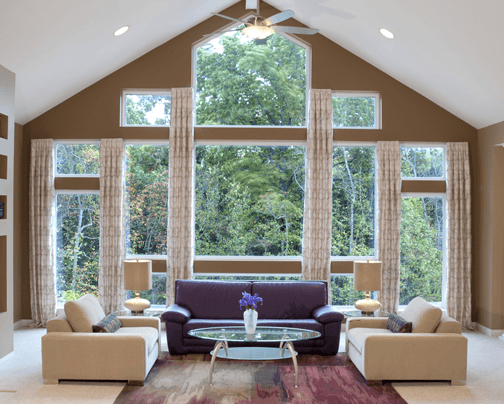


When the time comes to replace the windows in your home, there are a lot of factors to consider. One quality you should absolutely not overlook is durability. The durability of replacement windows varies, depending on the frame and sash material, the weatherstripping, the glass used, and the precision of the installation. To ensure you choose replacement windows that serve you well for decades to come, here are some qualities you’ll want to look for.
Frame and Sash Material
Look for windows with high quality workmanship throughout the frames and sashes, as they are less likely to crack or deteriorate. You’ll also want to choose a material that is resistant to cracking, shows little expansion and contraction when the temperature changes, and resists molding when exposed to moisture.
Instead of aluminum or vinyl frames, which are both strong but have their downfalls, consider choosing Fibrex® window frames. Fibrex® composite material features the strength and durability of wood, but like vinyl, it requires little to no maintenance. Unlike vinyl, Fibrex® expands and contracts very little, even Dayton where the winters are cold and the summers are hot. For this reason, it is less prone to cracking and deterioration than other frame materials. Fibrex® won’t mold when exposed to moisture, so you don’t have to worry on those rainy days.
Insulating Glass Seals
A common issue limiting the durability of replacement windows is weak glass seals. If the seal fails, the gas between the glass panes can leak out, reducing the insulating ability of the window. To ensure your windows don’t suffer this issue, choose insulated glass windows that carry the Energy Star certification. Energy Star requires that windows undergo weathering tests to determine whether the insulated glass will hold up through temperature changes, humidity fluctuations, and UV exposure. If a window carries the Energy Star label, you can be confident that the seal will hold up well and prevent gas leakage.
Weatherstripping
Weatherstripping forms an important barrier between your windows and window sashes. It must stand up not only to changes in temperature and humidity, but also to the friction created when the glass panes are opened and closed. Manufacturers of cheaper replacement windows often cut costs by using inexpensive weatherstripping materials that may fail within a few short years, allowing moisture and air to seep into your home. Higher-quality windows will have better quality weatherstripping. Recent technological advances have made synthetic weatherstripping the go-to option for manufacturers of higher-quality windows. These synthetics resist expansion and contraction, don’t become brittle as quickly as conventional plastics, and don’t absorb moisture like felt weatherstripping.
The durability of replacement windows also depends on how they are installed. It’s important to work with a specialized window contractor who has experience with the specific brand and style of windows you’re selected. They will know how to best install your windows to prevent issues like air leaks, condensation buildup, and premature wear. Attempting to save money by installing new windows yourself is likely to cost you in the long run. Simple mistakes during installation can greatly reduce your windows’ durability.
If you’re careful to choose windows with durable Fibrex frames, Energy Star-approved insulated glass and synthetic weatherstripping, and if you have them installed by a professional, then you can have confidence in their durability. When you’re ready to replace the windows in your Dayton home, get in touch with Renewal by Andersen to schedule your free in-home consultation.